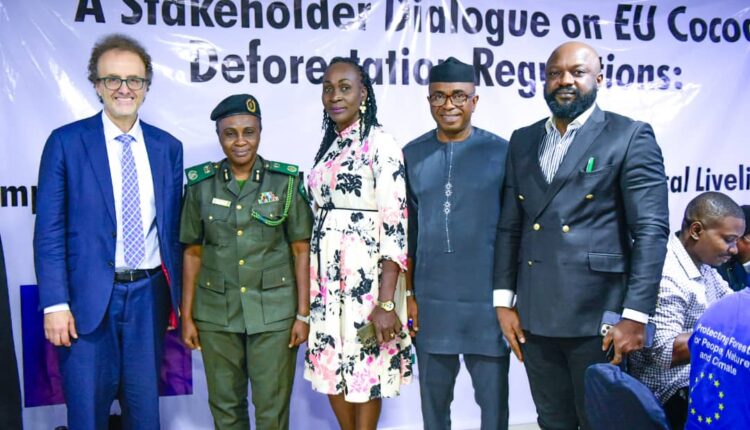EU markets won’t buy Nigeria’s farm yields from protected forest areas
|
Getting your Trinity Audio player ready...
|
By Akpan David, Calabar
Cocoa, its allied products and other agricultural products grown and harvested from restricted areas such as National Parks will no longer enter any European Union, (EU), markets.
The EU has since come out with a regulation called European Union Deforestation Regulation (EUDR) which is coming to force on 31 December 2024.
The regulation aims at ensuring that commodities taken into the EU markets are not driving deforestation and forest degradation.
Head of Cooperation EU Delegation to Nigeria and ECOWAS, Massimo De Luca spoke at a stakeholders dialogue on EU cocoa deforestation regulations in Calabar.
It was organised by Wildlife Conservation Society, WCS, to further create awareness amongst farmers and other stakeholders about the impact of the EUDR.
Massimo said, “The regulation aims to discourage farmers from cutting trees in protected forests for farming or other commercial purposes.”
He cautioned that such farm yields shall no longer access EU markets.
“This is a way to discourage people including bigtime farmers from further depleting protected forests in nigeria and elsewhere.
“Through traceability, EUDR aims to ensure that imported products are produced in a sustainable way by a strong and productive chain, for the benefit of both producers and forests”, he stressed.
Massimo further advised that, “Increasing productivity of existing farms is critical to combining conservation of the last remaining forest areas with secure livelihoods for smallholders.”
Following fruitful exchanges, stakeholders defined priorities to meet the EUDR requirements, including harmonized efforts to improve mapping of cocoa farms and clarification of protected area boundaries.
They 35 stakeholders agreed to continue the discussion on the EUDR impacts at the Calabar Cocoa Festival next month to see how Nigerian farmers can benefit from other components of the EUDR.
Also speaking, country director of the WCS, Andrew Dunn explained that “by making cocoa more sustainable, we can protect livelihoods as well as forests and wildlife corridors.
He stated that Cross River National Park is an invaluable part of Nigeria’s natural heritage, and there is need to protect it.
As a way of discouraging economic dependence on the restricted forests, Dunn disclosed that they have given supports to cocoa industry in the vicinity of Cross River National Park, a proposed World Heritage Site.
“We’ve supported 615 cocoa farmers and provided over 150,000 improved cocoa seedlings to boost productivity of farms that do not encroach on forests Since 2020.”
Conservator of CRNP, Mrs Caroline Olory lamented that there has been vast depletion of the park by activities of illegal miners, commercial farmers in connivance with host communities.
She said the EUDR needs to be domesticated, adding that there have been many local legislations which can still be effective even though enacted several decades ago.
Stakeholders called for updating and globalizing of Nigeria’s forests maps to aid latest technology to track violators of protected areas.
Due to aging cocoa farms, which has become less productive, farmers try to compensate for the loss of productivity by cutting down more forest each year to extend existing farms.
Cocoa accounts for 85% of farmers’ income. It is also the main factor in the loss of over 12,800 hectares of forest every year.



Comments are closed, but trackbacks and pingbacks are open.